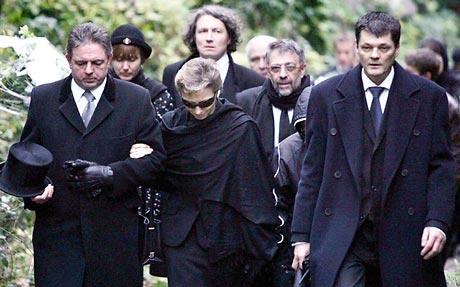Slain ex-spy had affinity for Chechnya
(AP)Updated: 2006-12-08 16:44
LONDON - Alexander Litvinenko counted some of the staunchest foes of the Kremlin among his friends, including leaders of the Chechen separatists who have fought two wars against Moscow.
|
|
How did a former Russian spy come to sympathize with rebels who have killed so many in his motherland? And was his support for Chechen independence tied to his death?
"He was really a guy [with a] mission," said Litvinenko's friend, Andrei Nekrasov.
The 43-year-old Litvinenko, who died of radiation poisoning two weeks ago, knew a lot about Chechnya: He served there with Russia's Federal Security Service, or FSB. After he sought asylum in Britain in 2000, he forged a friendship with Chechen rebel envoy Akhmed Zakayev.
Around the time he was poisoned, Litvinenko was investigating the murder of Anna Politkovskaya, a Russian journalist who was shot in her Moscow apartment building in October.
Over the years, Politkovskaya had angered many in the military and the government by reporting on alleged human-rights abuses by Russian troops and pro-Russian Chechen forces in Chechnya.
Litvinenko's experiences - both in Chechnya and after - made him sympathetic to the cause of Chechen independence, said Vladimir Bukovsky, Litvinenko's friend and fellow critic of the Kremlin.
The former FSB counterintelligence officer was so moved by the rebels' struggle, Bukovsky said, that his dying wish was to be buried in Chechnya eventually.
"On his deathbed, he asked to be buried when the war is over in Chechen soil," Bukovsky said after a memorial service at a London mosque. "He was a fierce defender of Chechnya and critic of the Kremlin."
Litvinenko was buried after Thursday's service in a London cemetery, his body sealed in a coffin to prevent further contamination.
Officials said contaminated body posed no risks if buried, but they warned the family would have "to wait 22 years for the radioactive material to decay" if they wanted to cremate the remains, friend Alex Goldfarb said.
Since he was stricken, seven employees at a London hotel where Litvinenko met businessman Dmitry Kovtun the day he fell ill have tested positive for low levels of polonium-210, Britain's Health Protection Agency said Thursday. Russian officials said Kovtun has developed an illness connected with polonium-210.
Marina Litvinenko, the agent's wife, also received a dose of the poison, but doctors say it was not enough to make her sick.
She was among 50 family and friends Thursday who gathered to pay tribute to him in an isolated section of historic Highgate Cemetery.
At the cemetery, Lord John Rea, director of the Save Chechnya campaign, held up a picture of Politkovskaya, the slain journalist. Boris Berezovsky, a Russian tycoon and one of the Kremlin's most powerful critics, attended as did Zakayev, the Chechen envoy.
Chechnya is a predominantly Muslim region of Russia, where Russian military forces have twice tried to crush separatist rebels in the past 12 years.
The fighting has been marked by human-rights abuses on both sides, according to Human Rights Watch and other groups.
But it is Chechen terror attacks against Russian civilians that have drawn the most attention. Rebels from Chechnya and some of Russia's other Islamic regions staged a string of suicide bombings in Moscow. They seized a Moscow theater in 2002, and staged another bloody siege in a school in the city of Beslan in 2004.
For some, Litvinenko's reported conversion to Islam raised suspicions that he was sympathetic to insurgents. For others, it represents his identification with the underdog.
Some questioned whether he had really converted at all.
Goldfarb confirmed an imam had visited him in the hospital. One friend, who spoke on condition of anonymity, said the family wanted a non-denominational funeral, fearing "the inevitable attempt by Litvinenko's enemies to portray him as an associate of Islamist terrorists."
Despite this, an imam appeared uninvited and performed rites at the burial, Goldfarb said.
|
||
|
||
|
|

